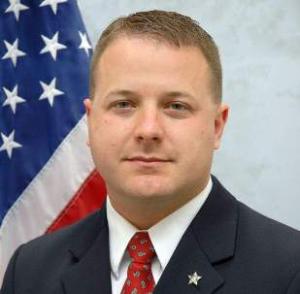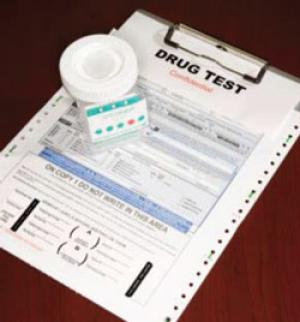A severe lack of funding could prevent any of the California marijuana reform initiatives from making the ballot. "Anyone got a spare $2 million?" the campaigns asked plaintively at a Mill Valley public meeting Tuesday night.
Faced with GOP demands to drug test people seeking unemployment benefits, the Democrats first fought them off, then accepted some testing as a compromise to get the payroll tax extension passed.
Sen. Rand Paul is placing a giant stop sign in front of the Senate as it rushes to enact new bans on new drugs.
A Colorado marijuana legalization initiative looks almost assured of making the November ballot after organizers handed in a final 12,000 signatures. They only need 2,400 valid ones.
A California initiative to reform the state's Three Strikes law is financially well-placed to make the ballot after George Soros kicked in half a million bucks.
Even though the governor, the public safety commissioner, and the public all want decriminalization, Vermont's House speaker is blocking it, citing law enforcement concerns.
From Alabama to Washington, medical marijuana continues to be a burning issue.
Cannabis coffee shop owners in the Dutch city of Haarlem are organizing to fight back against the Dutch government's pending Weed Pass plan that would bar foreigners and require Dutch citizens to join "members only" coffee houses if they want to buy weed legally.
A Florida sheriff's narcotics detective has been shot dead after trying to force his way into a residence. The suspected meth dealer who shot him was shot and killed, too.
A Texas man is dead after allegedly running away from, then pulling a gun on, members of Texas combined task force doing a drug investigation.
More asset forfeiture problems in Texas, plus a typical weekly rogues' gallery of dirty cops.
Events and quotes of note from this week's drug policy events of years past.
Proponents of four out of five of the California marijuana initiative campaigns came together to tout the merits of their various measures at a public meeting in Mill Valley, just across the Golden Gate Bridge and up the road from San Francisco, Tuesday night. But the take away message from the confab was that every single one of the initiatives is in serious trouble if it doesn't get a large cash injection -- and soon.

the crowd listens in Mill Valley
Three of the initiatives,
Regulate Marijuana Like Wine 2012 (
RMLW), the
Repeal Cannabis Prohibition Act of 2012 (
RCPA), and the
California Cannabis Hemp & Health Initiative of 2012 (
CCHHI), offer competing, though mostly similar, versions of legalization, while the
Marijuana Penalties Act of 2012 would expand decriminalization. The fifth initiative, the
Medical Marijuana Regulation, Control and Taxation Act of 2012 (
MMRCTA), seeks to bring statewide regulation to the state's confused and chaotic medical marijuana marketplace.
Disinterested but detailed summaries of each initiative are available at the state Legislative Analyst's Office (LAO)
initiative fiscal analysis web page, and are highly recommended reading for those interested in the finer picture of what each initiative does. But in summary, according to the LAO, each of the three legalization initiatives would change state law to legalize marijuana possession by adults and regulate the legal commerce in it.
Equally striking, in the LAO's analysis, each of the three legalization initiatives would save the state either "potentially tens of millions of dollars" (
RMLW) or "potentially the low hundreds of millions" (
RCPA,
CCHHI) annually in pot prohibition enforcement costs foregone. At the same time, any of the three would generate "potentially hundreds of millions of dollars" annually in tax revenues, while the
MMRCTA would generate "tens of millions of dollars" in potential additional revenues.
The LAO took care, however, to point out that its fiscal impact estimates, and especially its revenue estimates, depended highly on the nature of the federal response to marijuana legalization in California. The figures cited above happen only if the federal government allows a legal marijuana commerce to thrive.
With that pot of green gold from legalization enticingly foreseeable, even if the path past federal intransigence is unclear, the frustration of initiative campaigners at their inability to raise money to get on the ballot is evident. With each day that passes without a paid professional signature-gathering campaign underway, the cost of gathering each signature goes up. And the clock is ticking. The initiatives have only until April 20 to turn in 504,000 valid voter signatures.
"Time is running out to get these initiatives on the ballot,"
RMLW campaign presenter Steve
Collett, a Los Angeles attorney, told the crowd. "We're going to need to raise some money to do it. We think we need about $2 million to get on the ballot, and then we can reap $230 million a year forever."
Collett pointed to
RMLW's list of endorsements and a poll it commissioned showing 62% support for the measure as enticements to potential funders.
RMLW is going to need those funders, and it's in the best shape of any of the legalization initiatives.
The
RMLW campaign had only raised $131,000 by the end of December, according to the
California Secretary of State, and only another $20,000 since then. It currently has only 40,000-50,000 signatures gathered. The other campaigns are in even worse shape.
"We're all down to the last minute," said Oakland attorney Bill Panzer, spokesman for the
RCPA campaign. "If we don't get money to get professional signature-gatherers, we don't get on the ballot," he added. "But," he reminded the audience, "with Proposition 215, we got most of the signatures in five weeks with the professionals."

Dale Gieringer of MMCTR and Bill Panzer of Repeal
spokesman Buddy
Dusy was mum about fundraising, but said the campaign had 130 paid signature-gatherers. "We need to do it for Jack
Herer," he said.
California NORML head Dale
Gieringer, who acted as spokesman for the
MMRCTA campaign, said it was in do or die negotiations with potential funders right now and has a team of experienced campaign professionals ready to go.
"These are very critical negotiations going on right now, and we will know within another week or so if this comes through," he said. "If we don't get the money, we're not going to get on the ballot."
"Proposition 19 was the wrong election year, it was poorly drafted, and it was opposed by people in our movement who feared for patients' rights, but it still did very well," said Panzer. "Any of these initiatives can pass if they make it to the ballot."
But
Gieringer argued that fixing medical marijuana needed to come first.
"All the polls I've seen show that legalization is very dicey in California, but when you talk about medical marijuana and the need for regulation, support is in the
60s," he told the crowd. "It's hard to call on the public to further liberalize the marijuana laws when they feel things are chaotic enough with medical marijuana. We have to demonstrate that we can regulate medical marijuana to make the public comfortable enough to move on to the next step, legalization."
Although there was talk Tuesday about forging unity, none of the initiative campaigns was prepared to give up and go to work for the other. That leaves three legalization campaigns and the medical marijuana initiative all competing for the same funding, and all of them -- so far at least -- coming up short.
While, barring a miracle, seeing marijuana legalization on the California ballot this year looks extremely unlikely, perhaps the movement can get its act together for 2014 or 2016. At least, the campaigns are starting to talk about it.
"We need a coalition of all the legalization people to create an organization that will be a true legalization coalition in California," said
Collett. "We have the same long-term objectives, but differences about how to go about it. Sometimes egos get in the way, but we have to focus on the 70,000 Californians getting arrested for marijuana every year."
back to top
As part of a deal approved Friday to extend the payroll tax cut and unemployment benefits through 2012, Congress has given its okay to allow states to drug test people applying for those benefits. The move, initially opposed by Democrats, came after the Democratic leadership bowed to Republican pressure in its eagerness to get the bill passed.
Republicans had initially called for drug testing for everybody seeking unemployment benefits, but Democrats balked before backtracking and agreeing to allow testing for those who lost their jobs because of drug use and those applying for jobs in industries where drug testing is prevalent.
It's worth noting that people fired from their jobs for drug use are fired "for cause" and not laid off for lack of work, and thus are ineligible for unemployment benefits anyway. But the provision allowing for drug testing in industries where it is common could expose hundreds of thousands of unemployed workers to drug tests before they could receive unemployment checks. None of those workers was laid off because of drug use.
The deal effectively moves the burden of drug testing from employers, who freely decide whether they think testing has more benefits than costs, to state governments and their taxpayers -- at least in those states that decide to use the new tool. Drug testing is also more likely to be imposed on lower skilled workers than on white collar workers because those sectors are where drug testing is most prevalent now.
Democratic lawmakers downplayed the extent of drug testing about to be foisted on laid-off workers, while Republicans said they would be widespread. The bill requires the Labor Department to draft regulations to determine who will be subjected to drug testing. Those subject to drug testing will be those unemployed workers "for whom suitable work as defined under the state law is only available in an occupation that regularly conducts drug testing as determined under regulations issued by the Secretary of Labor," a Democratic staffer explained to the
Huffington Post.
"I think it's a small percentage," Rep. Sander Levin (D-MI), ranking Democratic in the House committee overseeing unemployment insurance, told the Post.
But Republicans cited employer surveys to argue that drug testing would be widespread, with one survey reporting that 84% of employers required drug tests for new hires.
"That's total nonsense," said Levin. "No way 80%."
But while Democrats and Republicans quibbled over how many jobless workers would be forced to endure the intrusive and humiliating ritual, the
Drug Policy Alliance was clear and concise in its opposition to the move.
"This policy is a terrible one-two punch to the gut for thousands of struggling Americans," said Bill Piper, the group's national affairs director. "Congress has paired a generous taxpayer subsidy for corporations that drug test with a slap in the face for those struggling to find work, feed their families and keep their homes. The American people have a right to be upset over being forced to subsidize the violation of their civil liberties, when they try to access a program that they pay for with every paycheck. Drug testing is expensive and ineffective, and distracts from evidence-based policies that actually reduce the problems associated with drug use and misuse."
back to top
Sen. Rand Paul (R-KY) is blocking three Senate bills that seek to prohibit new synthetic drugs. Rand spokesperson Moira Bagley confirmed to the Lexington Herald-Leader that he has had a "hold" on the bills for the last three months and that he has no intention of lifting it.

Rand Paul
Under Senate "unanimous consent" rules, any senator can place a hold on any bill. A hold doesn't kill a bill, but makes it more difficult for it to pass. A bill with a senatorial hold would require 60 votes to bring it up for consideration over the holding senator's objection.
Paul's main reason for blocking the bills, he told the
Kentucky New Era, is that federal penalties for drug law violations are "disproportionate" and doesn't allow judges discretion in sentencing. "The main reason we are opposing this is someone could be kept in prison for 20 years," he told the Era.
Another reason Paul blocked the bills is that he believes "enforcement of most drug laws can and should be local and state issues" and that the bans could hinder efforts to be beneficial research on the substances, Bagley told the Herald-Leader. Bagley added that the federal government has the authority to issue "emergency" bans of the synthetic drugs without needing congressional action. (The DEA has in fact enacted separate temporary bans on synthetic
cannabinoids and synthetic stimulants.)
The substances in question are synthetic
cannabinoids ("fake weed") sold under names such as Spice and K2, as well as synthetic stimulants being sold as "bath salts." The substances have become increasingly widespread since being introduced here in recent years, but so have reports of adverse reactions and emergency room visits linked to them.
The bills in question are
Senate Bill 409, introduced by inveterate drug warrior Sen. Chuck
Schumer (D-NY);
Senate Bill 605, introduced by inveterate drug warrior Sen. Charles
Grassley (R-IA), and
Senate Bill 389, introduced by Sen. Amy
Klobuchar (D-MN).
A similar, but not identical, measure,
House Bill 1254, passed the House in December. If any of the Senate bills manage to get passed, they would have to be reconciled with the House bill in conference committee.
But prospects for their passage are complicated at best, given the 60-vote firewall, and the fact that the Senate has other pressing business to attend to. That has the bills' sponsors frustrated. Last week, they took the unusual step of taking to the Senate floor to urge Paul to lift his hold.
Schumer said that while he understood the right of a senator to block a bill, Paul shouldn't be able to block a debate. "Let's see if he can win people over to his point of view," he said.
"Let's hear what the objections are, and then pass these bills," said
Klobuchar.
But it doesn't look like Paul is budging.
back to top
The proponents of a Colorado initiative to
Regulate Marijuana Like Alcohol turned in more than 14,000 additional voter signatures Friday in a last bid to qualify for the November ballot. The initiative needs only 2,400 valid signatures to qualify, meaning a whopping four out of five signatures handed in would have to be invalidated to keep the measure off the ballot.
The campaign had earlier turned in 159,000 signatures, nearly twice the 86,000 needed to qualify. But on examining the signatures, state election officials found that nearly half were invalid, an usually high percentage.
The initiative would amend the state constitution to allow the use, possession, and limited growing of marijuana by persons aged 21 or over. It would also establish a system through which marijuana is taxed and regulated -- like alcohol.
If the initiative qualifies for the ballot, Colorado will become the second state to ask voters to choose to legalize marijuana this year.
New Approach Washington has successfully placed a similar measure,
I-502, on the Washington ballot. Legalization initiative campaigns are also underway in California, Michigan, Missouri, Montana, Nebraska, and Oregon, but none of those have passed the signature-gathering hurdle.
back to top
An initiative that seeks to reform California's three-strikes sentencing law appears to have the financial wherewithal to qualify for the November ballot after philanthropist and drug reform supporter George Soros kicked in $500,000 donation last Friday. The Three Strikes Reform Act of 2012 has now accumulated more than $1.2 million in contributions.

California prison overcrowding
The conventional wisdom is that a California initiative needs at least one million dollars just to get through the signature-gathering phase. Initiatives need 504,000 signatures to qualify for the ballot, a daunting task that defeats all but the best funded campaigns.
The other big contributors reported are Stanford University professor David Mills, the measure's proponent, who has so far kicked in $603,000, and Washington, DC, investor Peter Ackerman, who gave $100,000.
The initiative would amend the state's Three Strikes law, approved by voters in 1994, so that only serious or violent felonies would count as a third strike punishable by 25 years to life in prison. It would also allow re-sentencing for people serving three strikes sentences if their third strike was not a serious or violent felony.
A 2004 initiative that would have reformed the three strikes law made the ballot and appeared to be on the verge of victory until a campaign against it spearheaded by Arnold Schwarzenegger turned the tide at the last minute. That initiative, known as Proposition 66, lost with 47.3% of the vote. Soros also donated to that campaign, kicking in $400,000.
This year's campaign has until May 14 to turn in signatures.
back to top
Although it has the support of the governor and the public, a Vermont bill to decriminalize the possession of small amounts of marijuana is stalled, held hostage by a hostile House speaker, the Barre-Montpelier Times-Argus reported Saturday.

Vermont Speaker of the House Shap Smith is blocking a decriminalization bill. (State of Vermont)
Under the bill,
House Bill 427, possession of less than an ounce by people 21 and over would be punishable by no more than a $150 fine. People aged 18-20 would be subject to the fine on a first offense and a drug awareness course or community service on the second offense. Minors would be subject to drug awareness or community service for a first offense and could be fined up to $300 for failure to comply. Current law mandates up to six months in jail and a fine of up to $500 for simple possession.
Speaker of the House
Shap Smith is blocking the bill. Tom Cheney, an aide of Smith's, told the Times-Argus the bill will not make it to a floor vote this session. Cheney said Smith had concerns that some in the state’s law enforcement community may not support the legislation.
That wouldn't include Commissioner of Public Safety Keith Flynn, who has said he supports decriminalization and that the state should make better use of its law enforcement resources. That also wouldn't include
Gov. Peter
Shumlin (D), who has said he supports decriminalization because it would free up law enforcement resources.
Flynn and
Shumlin are joined by a majority of the state's voters in supporting decriminalization according to a poll last week. Commissioned by the
Marijuana Policy Project (
MPP), which is pushing the legislation, the
Public Policy Polling survey found that 63% supported decriminalization as envisioned in
HB 427, with only 29% opposed. The poll also found that 52% said if their legislator voted for decriminalization, they would be more likely to vote for him or her, while only 25% would be less likely.
"It's time for legislative leadership to bring this sensible proposal to a vote, so that Vermont can focus its limited criminal justice resources on crime with actual victims," said Karen O'Keefe,
MPP director of state policies.
Somebody needs to get the Speaker of the House on the same page as his colleagues, his governor, and the people of Vermont.
back to top
From Alabama to Washington, medical marijuana continues to be a burning issue. Here's the latest:
Alabama
Supporters of a medical marijuana bill pending in the state legislature are
tweaking the bill to make it more palatable to lawmakers. The
Alabama Medical Marijuana Coalition, which composed
House Bill 66, is working on amendments to assuage concerns of legislators. One would add a 5% sales tax earmarked for city and county law enforcement to fight drugs; another would more closely define the doctor-patient relationship.
Arizona
The lawsuits are not over yet. Last week, the medical marijuana interests who filed a successful lawsuit to force state officials to implement the dispensary portion of the state's medical marijuana law filed an amendment to that lawsuit.
Compassion Care First is seeking a summary judgment against state officials over regulations that require that a medical marijuana dispensary employ a licensed physician as a medical director. The requirement to employ a medical director is not found in the Arizona Medical Marijuana Act passed by voters in November 2010, the lawsuit charges. Meanwhile, state officials said they were moving forward with the dispensary application and licensing process. Up to 124 dispensaries are allowed under the law.
California
Last Tuesday
, the Mendocino County Board of Supervisors quietly voted to amend the county's marijuana cultivation ordinance to eliminate the provision allowing collectives to grow up to 99 plants per parcel with a permit through the Sheriff's Office. The new ordinance reverts to the 25-plant limit for all growers, and is effective March 14. The county acted after the US Attorney's Office threatened to file an injunction against the county's ordinance and "individually go after county officials who were supporting these laws,"
5th District Supervisor Dan Hamburg said.
Last Wednesday,
the Greater Los Angeles Collective Alliance (GLACA) announced it was supporting the
Medical Marijuana Regulation, Control and Taxation Act of 2012, which would impose statewide regulation on medical marijuana operations.
GLACA only lists 13 dispensaries on its roster, but has been a powerful player as city hall deals with the issue. The group said it had donated $50,000 to the campaign, which is in its signature-gathering phase.
Last Thursday,
Sacramento County medical marijuana activists announced a local initiative campaign aimed at returning dispensaries to the county. Last year, there were at least 80 dispensaries operating in the county; now, after federal threats and the county's ban, there are nearly none. Longtime local activists Kimberly
Cargile and Mickey Martin are behind the
Patient Access to Regulated Medical Cannabis Act of 2012. It would allow one dispensary per every 25,000 people, for a total of 20 to 25 dispensaries and tax sales at 4%. It would also limit advertising and impose a 1,000-foot rule on dispensaries near schools and parks.
Also last Thursday,
the San Francisco Planning Commission approved three new dispensaries, all in the Excelsior district. There are currently 21 dispensaries in the city, but 12 have been the subject of federal inquiries. Last year, the feds were interested in five other dispensaries; those are all gone now after landlords received threat letters.
Last Friday,
the city of Murrieta won a preliminary injunction against a cooperative operating despite a local ban. The Greenhouse Cannabis Club can no longer distribute marijuana at the location, the injunction said.
Also on Friday,
President Obama was met by medical marijuana demonstrators when he came to San Francisco on a fund-raising trip. The action was part of a national week of action criticizing the Obama administration's hard-line approach on the issue.
On Monday,
Long Beach Vice Mayor Suja Lowenthal announced she intends to create a medical marijuana working group to research and evaluate ordinances in other cities and make recommendations following a review of the city's ordinance by the California Supreme Court. That should take between 12 and 18 months. The working group will include resident and business groups, medical marijuana dispensary representatives, the city attorney, the city prosecutor, city staff and others.
On Tuesday,
the DEA and local law enforcement raided a prominent Vallejo dispensary and arrested the owner. The raiders hit the
Greenwell Cooperative and arrested owner Matthew
Shotwell. The exact charges are not yet clear. While the DEA was present, the cops were executing a state search warrant and included agents from the State Board of Equalization, which deals with tax collections. Employees and patients alike were temporarily detained, and marijuana and other items were seized.
Also on Tuesday,
the Lake County Board of Supervisors unanimously approved placing a medical marijuana cultivation initiative on the June 5 ballot. The
Lake County Medical Marijuana Cultivation Act of 2012 was brought by Lake County Citizens for Responsible Regulations and the Lake County Green Farmers Association. Supervisors could have just approved the initiative, but decided to punt to voters. The initiative came after the board earlier crafted a restrictive ordinance.
That same day,
the Kern County Board of Supervisors voted to put a new dispensary ordinance on the June 5 ballot. The move comes after Kern Citizens for Patient Rights gathered more than 17,000 signatures to overturn the board's decision last summer to ban dispensaries. The board voted 4-1 to rescind the existing ordinance and put a new measure before voters in June. It includes restrictions on locations of dispensaries.
Also on Tuesday,
the Glenn County Board of Supervisors passed a medical marijuana cultivation ordinance. Personal gardens will have to be 300 feet to 1,000 feet away from schools, churches, youth centers and treatment facilities and can be no bigger than 100 square feet. Collectives, dispensaries and
collaboratives are banned in the unincorporated areas of the county.
On Wednesday, the
city of Berkeley ordered two collectives to shut down. The 40 Acres Medical Marijuana Growers Collective stopped operations in late January after Berkeley Code Enforcement sent it a letter informing the group it was operating in violation of the city's municipal code, but the Perfect Plants Patients Group is still in business. The collectives had run afoul of the city's zoning ordinances.
Colorado
Last week,
employees of the Budding Health dispensaries joined the United Food & Commercial Workers (UFCW) union. They become the first union medical marijuana shop in Denver, though not the first in the state's medical marijuana industry. The
UFCW organized some dispensaries in Fort Collins, but those have all been shut down by a local ban. The
UFCW has also organized workers in numerous California dispensaries and has become an advocate for marijuana law reform.
Last Thursday, national and state medical marijuana supporters announced the formation of the
Patient Voter Project to inform patients and their supporters about hostile actions taken by the Obama administration against medical marijuana. It's a joint effort by the Marijuana Policy Project (
MPP), Americans for Safe Access (
ASA), the National Organization for the Reform of Marijuana Laws (
NORML), Sensible Colorado, Safer Alternative for Enjoyable Recreation (SAFER), Medical Marijuana Assistance Program of America (
MMAPA), Just Say Now and others with a combined reach in Colorado of more than 40,000 online supporters.
On Tuesday,
a medical marijuana banking bill died in the Senate Finance Committee. The bill,
Senate Bill 75, would have created the authority for licensed medical marijuana stakeholders to form an exclusive financial cooperative specific to the industry, but committee killed the legislation on a 5-2 vote. The bill was responding to dispensary operators who reported that banks have refused their business for fear of repercussions from the federal government. The bill was opposed by Colorado Association of Chiefs of Police, the Colorado Drug Investigators Association, the Colorado attorney general’s office and the Colorado District Attorneys' Council.
Delaware
Last Thursday, the sponsor of the state's medical marijuana legislation urged
Gov. Jack
Markell (D) to reconsider his decision to halt implementation of the law.
Senator Margaret Rose Henry (D) said regulation-writing and licensing of dispensaries should continue despite veiled threats of prosecution of state workers by US Attorney Charles
Oberly III.
Markell had called a halt to the program a week earlier after receiving a threat letter from
Oberly. Delaware has no provision for patients to grow their own, so if there are no dispensaries, there is no medical marijuana program.
Michigan
Last Tuesday,
the Port Orchard City Council extended a moratorium on dispensaries and another on collective gardens for six more months. The two moratoria have been in effect for a year now and are intended to give city staff more time to develop appropriate land-use and zoning regulations for medical marijuana collective gardens and dispensaries. The city attorney said regulations could be completed during this six-month period, especially if the state legislature clarifies regulation at the state level.
On Tuesday,
the owner of the Herbal Resource dispensary in Owosso was charged with state marijuana cultivation distribution offenses. The charges stem from a January 19 raid by the Mid-Michigan Area Group Narcotics Enforcement Team (MAGNET).
Montana
The number of medical marijuana patients and providers is plummeting after state and federal crackdowns,
the Helena Independent Record reported Sunday. The number of patients peaked at 31,522 in May 2011, but has declined to fewer than 16,000 as of last month. The decline in growers and dispensaries is even more dramatic. For most of last spring, that figure hovered around 4,800, but following federal raids and the state legislature's virtual repeal of the voter-approved law, that number had declined by 90%, to 417. Under the 2011 law, all caregivers’ licenses cards became invalid on July 1, 2011. Those wanting to continue to legally grow and sell marijuana for medical reasons had to register with the department to get providers' cards.The number of participating physicians has also declined, but not so dramatically, dropping from a high of 365 last June to 274 in January.
That same day,
the Missoulian reported that medical marijuana providers busted by the feds in raids last year are getting relatively light sentences. Many faced five-year mandatory minimum federal sentences, but the sentences handed down so far, all the result of plea agreements that saw some charges dropped, have been considerably shorter, ranging from six months to 18 months. In the case of three men who had operated businesses in Helena and Great Falls, Senior Judge Charles Lovell criticized agreed-upon sentencing guidelines as "excessive," making particular mention of the fact that the three men believed their work to be legal under state law. He sentenced them to one year, instead of the 2 ½ recommended. More than 60 indictments have resulted from the federal raids, with some people receiving sentences of up to five years in prison -- not the mandatory minimum five years.
OregonHundreds of non-Oregon residents have obtained Oregon medical marijuana cards, the Oregonian reported Sunday. Since June 2010, when the state started issuing cards to non-residents, nearly 600 out-of-staters have traveled here to obtain one, according to the Oregon Health Authority, the agency that oversees the state's medical marijuana program. Some 72,000 state residents also hold medical marijuana cards. Neighboring states account for nearly two-thirds of out-of-state card-holders, with 309 from Washington, 138 from Idaho, and 50 from California.
Washington
On Wednesday, a bill that would have regulated dispensaries in the state died after failing to move before a legislative deadline. Sponsored by Sen. Jeanne Kohl-Welles (D-Seattle), Senate Bill 6265 was an effort to create a legal framework for dispensaries, but was opposed by some elements of the medical marijuana community.
back to top
All 16 cannabis coffee shops in the city of Haarlem have united in opposition to the Dutch government's "Weed Pass" program, which would bar foreigners from entry to the coffee shops and make the coffee shops "members only" for Dutch citizens. The plan foresees placing a cap on the number of members each coffee shop could have.

Haarlem, The Netherlands (wikimedia.org)
The conservative coalition governing the Netherlands doesn't like marijuana. It has created the Weed Pass program first as a measure to reduce "drug tourism" in Dutch border cities, and second as a means of restricting coffee shop numbers within the county. It was supposed to be rolled out in the border towns in January, but has been delayed until May, and is supposed to go nationwide next year, despite objections from, among others, the city of Amsterdam.
The
Haarlem coffee shop owners, unified as Team
Haarlems'
Coffeeshopentrepreneurs (THC),
announced Friday that they "have decided not to comply with the new criteria for tolerated coffee shops, like registering Dutch citizens as cannabis users, and discriminating against all non-Dutch coffee shop visitors."
The Weed Pass plan would bankrupt their businesses and lead to increases in street drug dealing and personal marijuana cultivation, the association warned. It cited the results of a poll of 700 coffee shop patrons it had conducted.
That poll found that only 12.4% of participants would register under the Weed Pass program. Nearly 63% said they would buy marijuana on the black market, while 21.7% said they would grow their own instead.
If coffee shops lost nearly 90% of their clientele, they would go broke, so complying with the Weed Pass "is simply no option," the association said. Closing up shop would result in the loss of about 90 "
budtender" jobs in the city, they added.
"We cannot beat bankruptcy, so our staff, customers and ourselves are ready to start a struggle with Justice Minister
Ivo Opstelten, before our civilized city will be divided in working areas for street dealers and drug runners," the association vowed.
Haarlem is a city of about 150,000 people just west of Amsterdam and on the northern fringe of the
Randstad, a conurbation of 7.1 million people, that includes Amsterdam, The Hague, Rotterdam, and Utrecht, and is one of the largest metropolitan areas in Europe.
back to top
A Clay County, Florida, sheriff's narcotics detective and a man he was investigating as a methamphetamine suspect were shot and killed in an exchange of fire last Thursday evening. Narcotics Detective David White and suspect Ted Arthur Tilley, 36, become the 10th and 11th persons to die in US domestic drug law enforcement operations so far this year.

Narcotics Detective David White (Clay County SO)
White was part of a nine-man investigating a reported meth lab at a residence in
Middleburg. When White and Detective Matthew
Hanlin approached the front door and attempted to speak with someone inside, the person slammed the door shut.
According to Clay County sheriff's office spokeswoman Mary
Justino, when police then tried to force their way in, they were met with gunfire. White was mortally wounded -- he died shortly thereafter at a local hospital -- and
Hanlin was shot in the left arm. He underwent surgery and is in stable condition.
As Tilley fled the home, he was shot and killed by another member of the sheriff's office, police said. Five other men at the scene were detained, but police later said only one had been arrested.
The owner of the home told News 4 Jax TV that it was in foreclosure, he hadn't lived in it for three years, and the men were squatting there without his permission. He said the home was one of dozens of abandoned homes in the immediate neighborhood.
back to top
A member of a Parker County, Texas, combined task force shot and killed an armed man during a drug investigation Friday afternoon. The as yet unidentified man becomes the 12th person to die in US domestic drug law enforcement operations so far this year.
According to Parker County Sheriff Larry Fowler, officers conducting a drug investigation on New Hope Road in the far northeast section of the county confronted two men and a woman. One man and the woman were stopped, but the second man fled, throwing packets of something on the ground.
That man then turned, assumed "a defensive position," and pointed a gun at the officers, Fowler said. "The officer called for him to stop," Fowler said. "He pointed a gun at the officer, and the officer shot him."
The man was pronounced dead at the scene. The other man was arrested, but the woman was released. A gun was found at the scene, Fowler said.
Fowler said police were in plain clothes, but with badges visible, and they identified themselves.
The officers involved were part of the Weatherford-Parker County Special Crimes Unit, which includes Weatherford police and Parker County sheriff's deputies, but the sheriff's office would not say which department the shooter worked for.
The Texas Rangers are investigating because it was an officer-involved shooting.
There is no word on what charges have been filed, if any, and what drugs, were found, if any.
back to top
More asset forfeiture problems in Texas, plus a typical weekly rogues' gallery of dirty cops. Let's get to it:
In Austin, Texas,
a former Brooks County sheriff is being investigated by the state attorney general's office over his lavish use of forfeited assets seized from drug and weapons suspects. The Corpus Christi Times details the allegations against former Sheriff
Balde Lozano as well as a broader investigation into asset forfeiture in Texas in a series of reports. A state auditor has questioned Lozano's spending on new cedar paneling for his office, 18 vehicle purchases and sales, and $80,000 in credit card transactions.
In Los Angeles,
a jailer at the LA County Jail was arrested last Monday on charges he was smuggling cocaine into the jail. Jailer Remington Orr, 24, was caught carrying the drugs when he went to work at the Men's Central Jail. He is charged with possession of a controlled substance with intent to sell, transportation with intent to sell, and bribery. He was jailed on $1 million bail. Three sheriff's guards have been convicted and a fourth fired in recent years for smuggling or attempting to smuggle narcotics into jail for inmates.
In Athens, Ohio,
a local police chief was arrested last Wednesday for peddling pain pills.
Buchtel Chief of Police Kelsey
Lanning went down after Athens County sheriff's deputies did a controlled buy at his home.
Lanning is accused of buying the prescription medication to give to someone who was working with the sheriff's Narcotics Enforcement Team.
In Oklahoma City,
an Oklahoma City police officer was charged last Friday with tipping off a drug suspect of an impending raid.
Sgt. Mari Christina Cervantes is charged with a misdemeanor count of obstructing police officers. In November 2010, police raided two locations, including the home of one of Cervantes' snitches. Police found text messages from Cervantes on his cell phone, including one telling the informant to "stay away," another hoping police wouldn't find anything, and a third saying, "They are supposed to be kicking in the door, but you didn't hear it from me."
In Fort Lauderdale, Florida,
a Miramar police officer was sentenced last Friday to two years' probation for searching the apartment of a drug suspect without a warrant and lying about it. Officer Jean Paul
Jacobi, 39, was found guilty in December of official misconduct, falsifying records, and criminal mischief and could have gotten up to five years behind bars. The state asked for two years, but the judge gave him probation, and if he keeps his nose clean, with deferred adjudication, his felony record will be wiped clean. The search in question occurred after police arrested a drug suspect in a traffic stop and seized his vehicle. The keys ended up with another
Miramar police officer, who gave them to
Jacobi, who used them to enter the apartment without a warrant.
back to top
February 23, 1887: The 49th Congress of the United States enacts legislation that provides a misdemeanor fine of between $50 and $500 ($1,100-$11,000 in today's dollars) for any US or Chinese citizen found guilty of violating the ban on opium.
February 26, 1995: Former mayor of San Francisco Frank Jordan is quoted in the Los Angeles Times, saying, "I have no problem whatsoever with the use of marijuana for medical purposes. I am sensitive and compassionate to people who have legitimate needs. We should bend the law and do what's right."
February 28, 1995: In compliance with the 1994 Crime Act, the US Sentencing Commission issues a report on the current federal structure of differing penalties on powder cocaine and crack cocaine, recommending that Congress "revisit" penalties enacted for those offenses.
February 29, 1996: In his State of the Union address, President Clinton nominates Army General Barry
McCaffrey, a veteran of Vietnam and Desert Storm, as director of the Office of National Drug Control Policy.
McCaffrey had been head of the US Southern Command (
SouthCom) which provides military backup for US policy in Latin America -- a policy long linked with chronically ineffective and corrupt drug enforcement.
February 25, 1997: President Bill Clinton proposes spending $175 million for a national television blitz targeting drug use by America's youth. Matching funds from the private sector would be sought. Clinton says, "If a child does watch television -- and what child doesn't -- he or she should not be able to escape these messages."
February 28, 1998: President Clinton re-certifies Mexico as a fully cooperating ally in the struggle against drug smuggling, despite a letter from 40 US senators urging Clinton to deny certification.
February 27, 1999: Conservative William F. Buckley,
Jr. is quoted in the New York Post: "Even if one takes every reefer madness allegation of the prohibitionists at face value, prohibition has done far more harm to far more people than marijuana ever could."
February 24, 2000: Members of the Belgian Parliament make a proposal to modify their laws in order to partially decriminalize the possession of cannabis and its derivatives. Simple marijuana possession is effectively decriminalized three years later.
February 28, 2000: UPI reports that Spanish researchers said the chemical in marijuana that produces a "high" shows promise as a weapon against deadly brain tumors. A research team from
Complutense University and
Autonoma University in Madrid found that one of marijuana's active ingredients, THC, killed tumor cells in advanced cases of
glioma, a quick-killing cancer for which there is currently no effective treatment.
back to top












